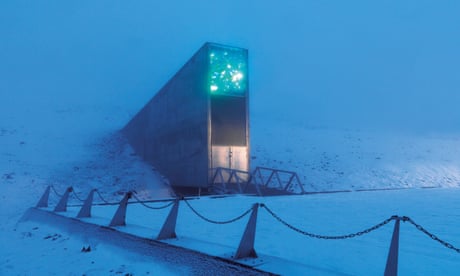- by foxnews
- 11 Mar 2025
Seed banks: the last line of defense against a threatening global food crisis
Seed banks: the last line of defense against a threatening global food crisis
- by theguardian
- 16 Apr 2022
- in news

There are roughly 1,700 seed banks, or gene banks, around the world housing collections of plant species that are invaluable for scientific research, education, species preservation and safeguarding Indigenous cultures.
Svalbard Global Seed Vault, Norway
Svalbard can store up to 4.5m varieties of crops and 2.5bn seeds . It houses more than 1.14m seed samples of about 6,000 different plant species.
Though it serves the global community, the seed vault is owned by the Norwegian government and managed with support from the Global Crop Diversity Trust, an organization dedicated to preserving crop diversity for food security.
ICARDA, Beirut, Lebanon
In February, ICARDA deposited 8,000 samples at Svalbard seed bank.
Millennium Seed Bank, Sussex, UK
Launched in 2000, and located in rural Sussex, England, the Millennium Seed Bank is considered to be the most diverse wild plant genetic resource in the world.
Vavilov Institute, St Petersburg, Russia
Located in St Petersburg, Russia, and considered one of the oldest seed banks in the world, the Vavilov Research Institute of Plant Industry was established more than 100 years ago by the Russian botanist Nikolai Vavilov, a pioneer in crop diversity conservation.
The institute nearly disappeared during the siege of Leningrad in the early 1940s but was saved by a group of scientists who guarded the species they had been collecting for more than 15 years at that point.
Today, the Vavilov Institute houses more than 325,000 seed samples, including seeds of crops that might otherwise have been permanently lost, such as Ethiopian wheat which was almost destroyed during civil wars in the 1970s.
National Laboratory for Genetic Resources Preservation, Fort Collins, Colorado
The National Laboratory for Genetic Resources Preservation in Fort Collins is operated by the US Department of Agriculture and serves as a backup to genetic plant material within the US. With a capacity to store 1.5m samples, 50% of which can be kept in cryogenic tanks, it currently houses more than 500,000 samples of genetic material from close to 12,000 plant species.
Seeds at the Fort Collins-based bank are often distributed to scientists for research and education and have also been used to prevent and treat disease resistance. In the 1980s, seeds from this bank helped overcome a Russian wheat aphid pest in Texas, when a couple of samples were found to be resistant to the aphid and were bred into affected wheat plants to control the infestation.
The Potato Park, Pisac, Peru
The Potato Park, located in Pisac, Peru, a rural village nestled in the Sacred Valley of the Incas, is a unique seed bank.
Managed by local Indigenous communities the park conservesa wide array of Andean crops including maize and quinoa but it has a special focus on potatoes, housing around 2,300 of the 4,000 varieties of potatoes known in the world, and 23 of the more than 200 wild species of potatoes currently known to humanity. Archeologists believe the potato was first domesticated around 8,000 years ago, near the bank of Lake Titicaca, which borders Bolivia and Peru.
Aside from being an essential project to conserve the genetic material of valuable crops, the Potato Park is a critical territory to preserve the Indigenous heritage of the six communities and more than 6,000 people who call this park home.
- by foxnews
- descember 09, 2016
High-end vacation resort bans children to achieve 'tranquil environment'
The Alila Marea Beach Resort, located in Encinitas, California, has announced that it's no longer accepting kids and is transitioning to an adults-only vacation spot.
read more


